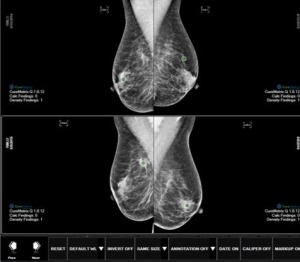por
John R. Fischer, Senior Reporter | November 02, 2022

Medicare cuts have driven one half of women enrolled in Medicare or eligible for the program to avoid getting an annual mammogram over the last three years.
Nearly half of women enrolled in or eligible for Medicare have not had a mammogram in the last three years, according to a recent survey.
Women with an average risk for breast cancer are advised to begin screening at age 40. Those with high risks should speak to their doctors sooner to increase their chances of early detection, which saves lives, and simplifies and makes treatment less disruptive, according to the Radiology Business Management Association.
Conducting a national survey of its Radiology Patient Action Network, RBMA interviewed 1,632 Americans enrolled in Medicare or Medicare-eligible. It found that lack of screening was driven by Medicare cuts, a concern to 80% of respondents. Additionally, 90% viewed maintaining Medicare coverage as important.



Ad Statistics
Times Displayed: 84847
Times Visited: 3017 Ampronix, a Top Master Distributor for Sony Medical, provides Sales, Service & Exchanges for Sony Surgical Displays, Printers, & More. Rely on Us for Expert Support Tailored to Your Needs. Email info@ampronix.com or Call 949-273-8000 for Premier Pricing.
"At a time when patients are already having difficulty receiving the care they need — like mammography screenings proven to detect and prevent breast cancer — members of Congress should take note of these findings and protect Medicare,” said Bob Still, executive director of RBMA, in a statement.
Almost half said they would be less inclined to support a member of Congress who advocated cuts. One out of four current patients said they had difficulty scheduling doctors’ appointments due to delays or rescheduling.
The survey was conducted in September 2022, and had a margin of error of +/-2.5%, with a 95% confidence level. It was sponsored by the Medical Imaging and Technology Alliance, Imaging for a Cause, and RBMA.
The findings are similar to another study conducted the same month by Orlando Health that showed that more than one fifth of women between 35 and 44 have
never gotten a mammogram and have no plans to do so.
Black women and other racial minorities are especially affected by these issues. A retrospective study conducted by the Neiman Health Policy Institute and the Radiology Health Equity Coalition found that inequitable geographic distribution of new advanced mammo technology
made it harder for Black women to get screened.
From 2005 to 2009, their chances of receiving digital mammograms instead of film-based one was 0.80, compared to whites. The odds were less likely for digital breast tomosynthesis, at 0.84, from 2015 to 2020.
Despite incidence rates being approximatley the same as whites, Black women are 40% more likely to die from breast cancer.
Dr. Kellie Schenk, a diagnostic radiologist with EPIC Imaging, PC, in Oregon and Imaging for a Cause participant, said it is "alarming" that nearly half of Medicare-aged women do not get an annual mammogram. "It is clear that further cuts to Medicare providers and vital screening services would only exacerbate this issue by limiting appointments and compromising quality of care."
Back to HCB News

